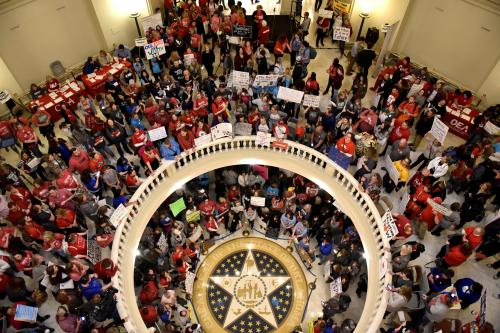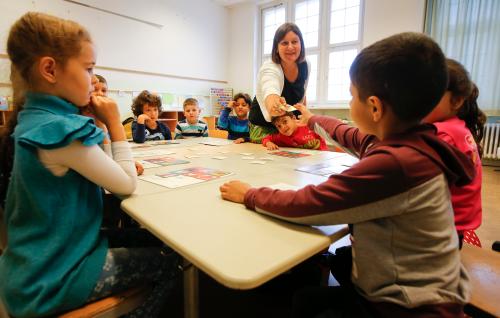Last month, we talked about the fact that teachers are more likely than others to work second jobs. Since then, there have been all sorts of stories about teachers in Oklahoma working multiple jobs—as many as six! And the stories are neither new nor limited to Oklahoma.
Presumably, teachers who take second jobs do it mostly—like anyone else—in order to supplement their salaries. Of course, low teacher salaries are a central issue in the teacher strikes that have swept the nation in recent months, so keep these teachers in mind when thinking about who might be working these second jobs. Thanks to work by Dr. Sam Sullivan and Dr. Robert Maninger at Sam Houston State University (SHSU), there’s quite a bit more to be said about teachers’ attitudes toward moonlighting.
For more than three decades, SHSU has conducted a biennial survey of Texas teachers under the auspices of the Texas State Teachers Association, the Texas affiliate of the National Education Association. Even though the survey results are from just one state, it’s an exceptionally large and diverse state and should help shed light on teachers’ attitudes that likely apply in other states as well. Also, as background, Texas teacher pay adjusted for cost of living is smack dab in the middle among all the states.
It’s worth pointing out that participation in the survey is voluntary, which argues that the answers may not be representative of all Texas teachers. For example, survey respondents report much higher rates of moonlighting (30-40 percent during recession years) than do representative national surveys (14-17 percent for the same time period). Whatever the biases may be, there’s no special reason to think the biases are likely to have changed greatly over time, so looking at trends certainly makes sense.
A first point: The survey results show that second jobs are way up. While the responses vary from year-to-year, both summer and school-year second jobs have increased noticeably—particularly around the Great Recession.
The survey asked moonlighting teachers how much of a raise would be needed to get them to drop their school-year jobs. As the next figure shows, the answers have been quite stable at a touch under 20 percent of salary. To me that suggests that dollars really are an important issue.
We can say something more about what predicts whether a teacher chooses to moonlight during the school year. Professors Sullivan and Maninger provided me with the underlying data from their 2016 survey. While teachers each have individual reasons for deciding about moonlighting, there are some clear average tendencies.
First, money matters, but it may not be the only thing that matters. It is noteworthy that the amount teachers say would be required to quit moonlighting is generally larger than the amount they actually make moonlighting; about 60 percent larger in fact. (A separate survey by Brown, Sullivan, and Maninger finds the same qualitative result.)
Second, supporting your family matters. Teachers who identify as the major breadwinner in their household are 12 percentage points more likely to report taking on a second job. In other words, the probability of moonlighting rises by over a third if you are the primary breadwinner.
Third, teachers’ attachment to teaching matters. Those who say they are considering leaving teaching are 9 percentage points more likely to report moonlighting. Some caution is needed here. We don’t know if teachers who moonlight actually do leave teaching, and we don’t know if teachers are moonlighting because they are unhappy in their jobs, or, if in the course of moonlighting, new career opportunities open up.
Finally, the reason we really care about public teachers moonlighting is whether doing so actually changes teachers’ classroom effectiveness. After all, research makes clear that quality teaching is the most important school-based input into education. We can think of ways it potentially could improve teaching (e.g., teachers bring new perspectives into the classroom) or make teaching worse (e.g., teachers are too tired). From the survey results, I can tell you what teachers who moonlight say: They say it’s bad for the quality of their own teaching. (This Vox story has a nice collection of anecdotes from tired teachers.)
While we still don’t know everything we might like to know about the causes and consequences of teachers taking second jobs, thanks to the work of Sam Sullivan and Robert Maninger we do know a lot more than we would otherwise. It seems clear that money is a cause, and some loss in teaching quality is likely a consequence.







Commentary
Teachers have been moonlighting in Texas—and elsewhere—to make ends meet
April 20, 2018